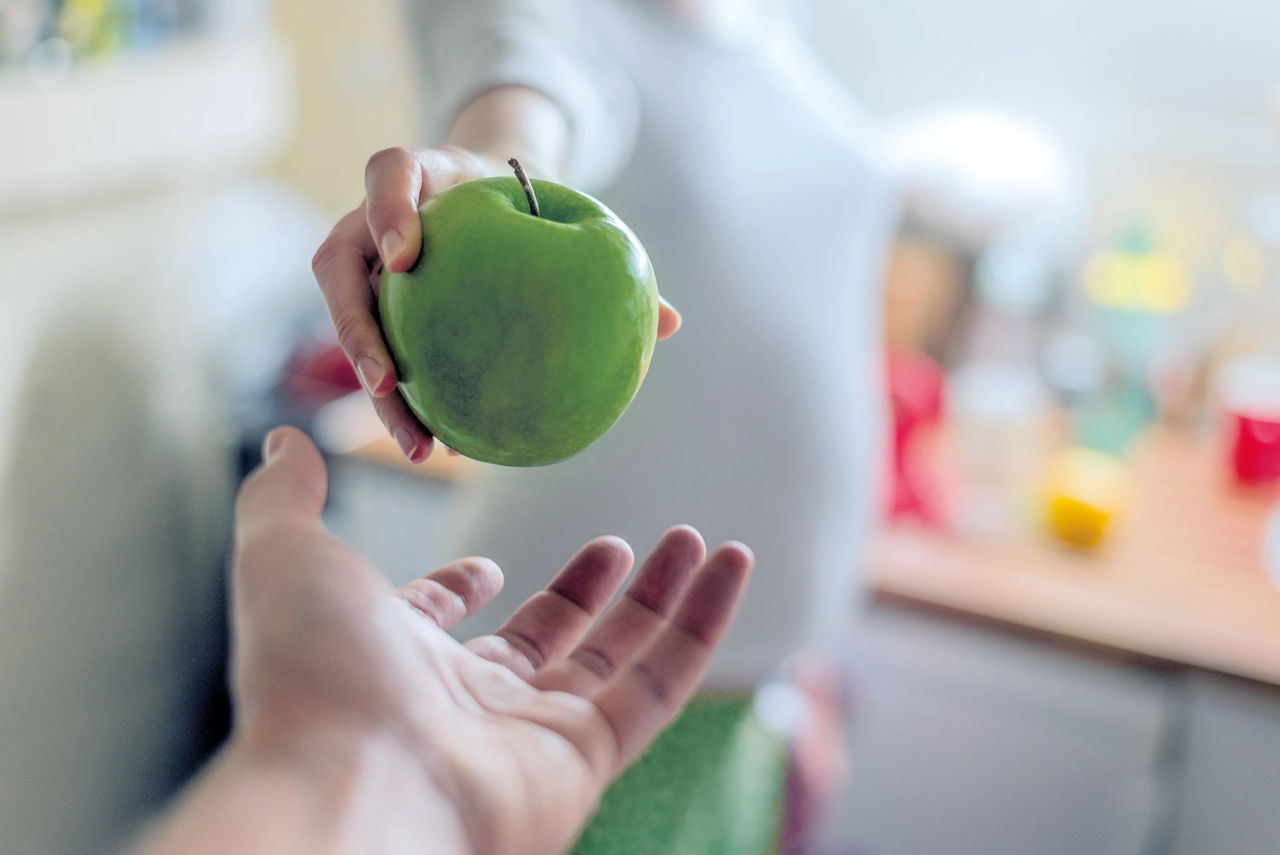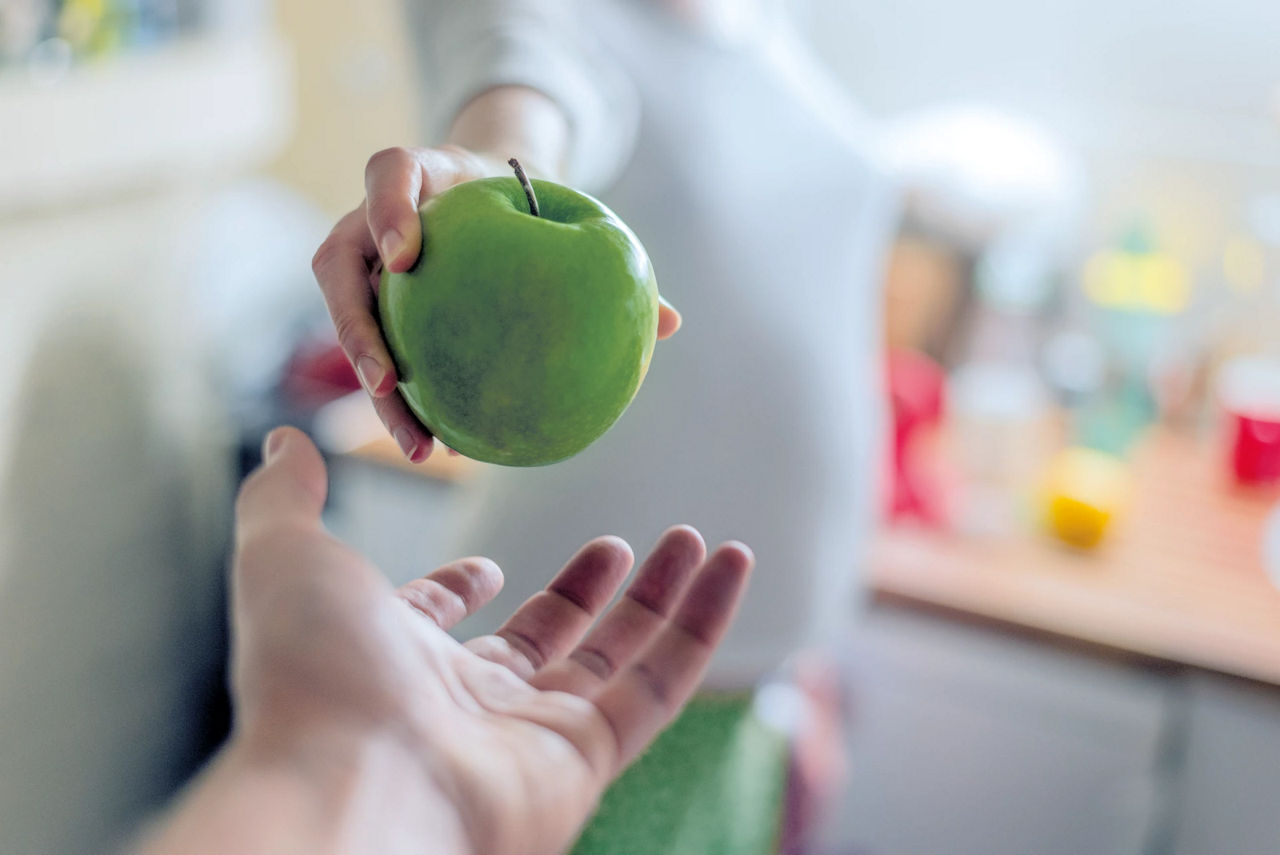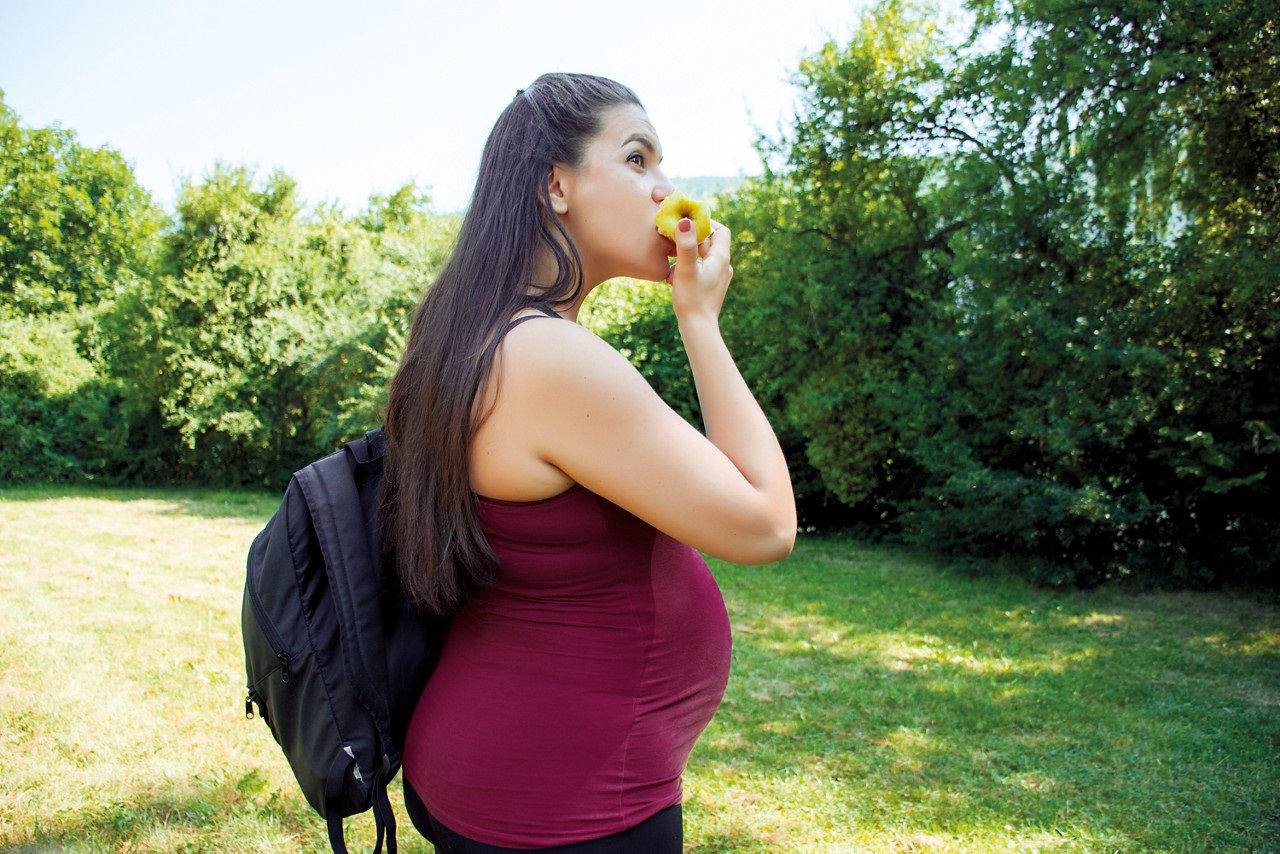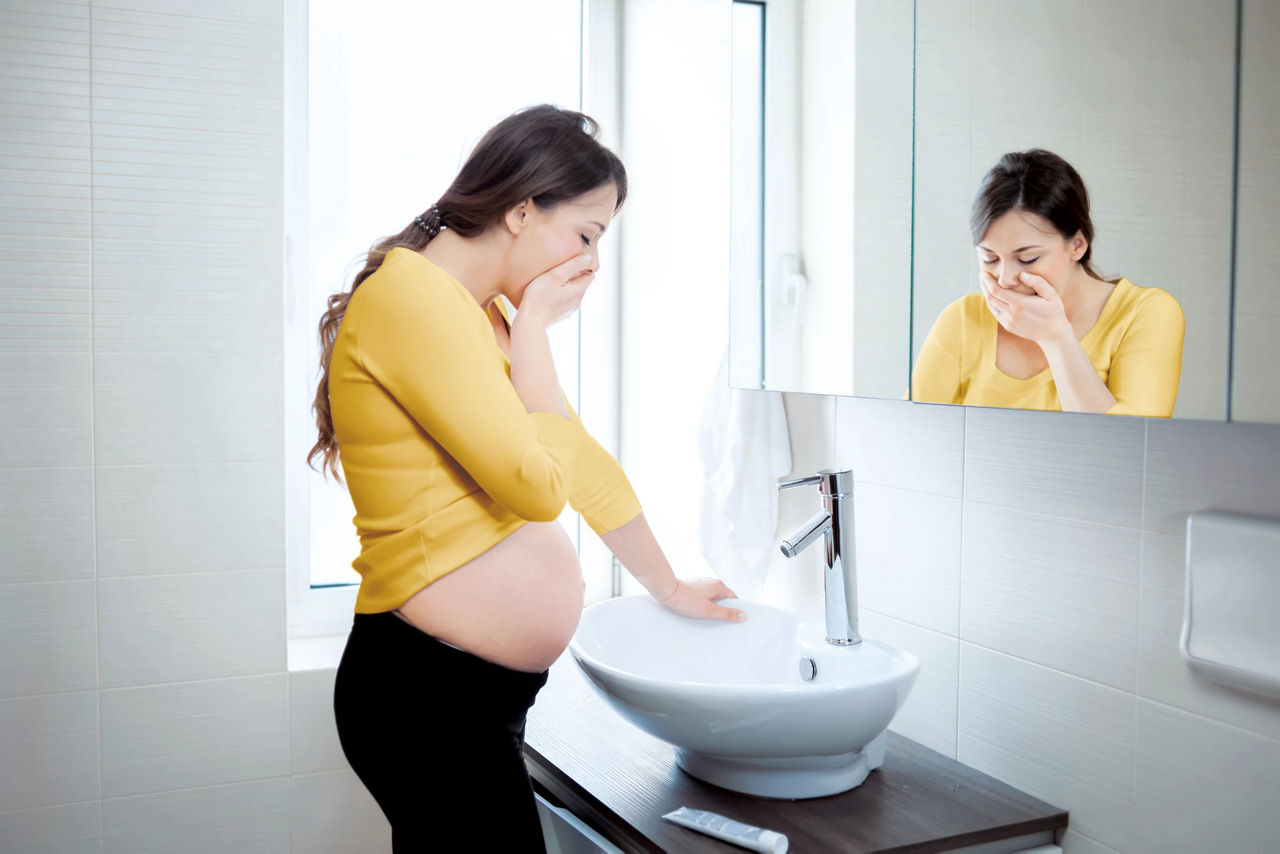Free weaning plan - Register here
What vitamins do I need to take during pregnancy?
During the first few months of pregnancy your baby is rapidly developing. Your body will need some additional nutrients to help facilitate this growth and development phase. Generally speaking, a healthy and balanced diet can provide you with most of the nutrients that you need, although there are a couple of exceptions to this (vitamin D and folate).
Which are the most Important vitamins during pregnancy?
The table below (Table 1) summarises the most important vitamins to consume during pregnancy.

Table 1: Important vitamins for pregnancy1-3
| Vitamin | Recommended amount during pregnancy | Role | Food sources |
|---|---|---|---|
| Vitamin A | 700 micrograms per day
Too much of the animal form of vitamin A (known as retinol) can be harmful to your baby. Therefore, vitamin A supplements are not recommended during pregnancy. | Vitamin A is needed for eye health, cell growth and immune function.
You can get all the vitamin A that you need from a healthy diet. | Animal Sources: butter, tinned salmon, cheese, eggs, full-fat milk, herrings and pilchards.
Non-Animal Sources: apricots, broad beans, broccoli, cabbage, melon, carrots, mango, peach and tomatoes. |
| Riboflavin (Vitamin B2) | 1.4 milligrams per day | Riboflavin helps the body to release energy from food. It keeps the skin, eyes and nervous system healthy | Animal Sources: cheese, eggs, lean meat or poultry, oily fish, milk and yoghurt.
Non-Animal Sources: almonds, fortified breakfast cereals, granary bread, mushrooms, soya beans and spinach. |
| Folate (Vitamin B9) | 400 micrograms per day | Folic acid helps to prevent neural tube defects and cleft palate in babies. | Broccoli, green leafy vegetables, fortified breakfast cereals, peanuts, peas, chickpeas and kidney beans. |
| Vitamin D | 10 micrograms per day | Vitamin D helps with bone development for you and your baby. | We get most of our vitamin D through a reaction that occurs when our skin is exposed to sunlight
Food sources include: oily fish (salmon, sardines, mackerel), red meat, egg yolks and fortified foods |
| Vitamin C | 50 milligrams per day | Vitamin C helps with skin and cell health. It’s also important for healthy immunity. | Oranges, peppers, strawberries, broccoli, brussels sprouts and potatoes. |
Which are the most important minerals during pregnancy?
The body needs small amounts of minerals which are responsible for the formation of your baby’s bones, body tissues and nerves. See the table below (Table 2) to find out which are the most important pregnancy minerals.
Table 2: Important Pregnancy Minerals1-3
| Mineral | Recommended amount during pregnancy | Role | Food sources |
|---|---|---|---|
| Iron | 14.8 milligrams per day | Iron helps to produce red blood cells and supplies oxygen to the cells. Low iron levels in pregnancy has been associated with low birthweight. | Animal Sources: beef, poultry, eggs, lamb, fish Non-Animal Sources: beans, black-eyed peas, broad beans, chickpeas, dried apricots, fortified breakfast cereals, lentils raisins, soya beans, spinach and tofu. |
| Calcium | 700 milligrams per day | Calcium is important for bone health for you and your baby. | Animal Sources: milk, cheese and yoghurt. Non-Animal Sources: green leafy vegetables, tofu, calcium fortified soya drinks, fish (where bones are eaten, such as sardines and pilchards). |
| Iodine | 140 milligrams per day | Iodine plays an important role within the thyroid. It helps to control many body processes. | Dairy Sources: butter, cheese yoghurt, milk, ice cream Non-Dairy Sources: eggs, fish, shellfish |
| Zinc | 7 milligrams per day | Zinc helps with the development of the baby's organs, skeleton, nerves and circulatory system. | Animal Sources: tinned fish, cheese, eggs ham, milk, poultry and prawns Non-Animal Sources: beans, lentils, bread, nuts, sesame seeds, tofu and wholegrain breakfast cereals. |
Supplements to take during pregnancy
Eating a healthy and balanced diet will help you to get most of the vitamins and minerals that you need during pregnancy. However, the NHS recommends two supplements to take during pregnancy. Speak with your GP or midwife about the Healthy Start vitamin scheme as you might qualify for supplements free of charge4.
Folic acid supplements for pregnancy
Folic acid plays a vital role in early pregnancy to prevent neural defects and may help reduce the risk of cleft palate2. Women are encouraged to take a 400-microgram folic acid supplement daily when planning a pregnancy and for the first 12 weeks of pregnancy. If you did not take folic acid before becoming pregnant, try not to worry - start taking it as soon as you know you’re pregnant up until the end of your first trimester (1-3 months).
If you have any of the following conditions, talk with you GP or midwife as you may need a higher dose of folic acid5:
- Diabetes
- Take anti-epilepsy medications
- Take antiretroviral medications for HIV
- You or the baby's biological father have a neural tube defect
- You or the baby's biological father have a family history of neural tube defects
- You have had a previous pregnancy affected by a neural tube defect
Vitamin D supplements for pregnancy
We get most of our Vitamin D from exposure to sunlight. Food sources contain some vitamin D too. During the autumn and winter months (October to April) it can be harder to meet our vitamin D requirements through sunlight alone. Pregnant women are advised to take a 10-microgram vitamin D supplement daily throughout pregnancy6.
Are there any supplements I should avoid during pregnancy?
High intakes of vitamin A should be avoided during pregnancy as it can be harmful to your baby. Multivitamins containing vitamin A and cod liver oil supplements should be avoided during pregnancy7.
How long do I need to take pregnancy vitamins for?
Folic acid supplements should be taken daily for the first 12 weeks of pregnancy as this is when your baby’s nervous system develops. If you are worried that your diet might lack foods which are rich in folate (such as green leafy vegetables and whole grain cereal), or if you are struggling to eat well due to nausea, it might be helpful to take a folic acid supplement for the duration of your pregnancy1.
Vitamin D supplements should be taken daily throughout pregnancy and whilst breastfeeding6. Speak with your GP or midwife for further information on this topic.
To share your stories or look for some friendly advice on pregnancy vitamins and supplements join the C&G baby club today.
- National Health Service. Vitamins and minerals [Online]. Last reviewed 2020. Available at: https://www.nhs.uk/conditions/vitamins-and-minerals/ [Accessed: December 2020].
- De-Regil L et al. Effects and safety of periconceptional oral folate supplementation for preventing birth defects. Cochrane Database Syst Rev 2015;(12).
- British Nutrition Foundation. Nutrition Requirements [Online]. Last reviewed 2016. Available at: https://www.nutrition.org.uk/attachments/article/234/Nutrition%20Requirements_Revised%20Oct%202016.pdf [Accessed: December 2020].
- National Health Service. Healthy Start [Online]. Available at: https://www.healthystart.nhs.uk/ [Accessed: December 2020].
- National Health Service. Vitamins, supplements and nutrition in pregnancy [Online]. Last reviewed 2020. Available at: https://www.nhs.uk/conditions/pregnancy-and-baby/vitamins-minerals-supplements-pregnant/ [Accessed December 2020].
- Davies SC et al. VITAMIN D - ADVICE ON SUPPLEMENTS FOR AT RISK GROUPS [Online]. 2012. Available at: https://assets.publishing.service.gov.uk/government/uploads/system/uploads/attachment_data/file/213703/dh_132508.pdf [Accessed: December 2020].
- National Health Service. Vitamin A [Online]. Last reviewed 2020. Available at: https://www.nhs.uk/conditions/vitamins-and-minerals/vitamin-a/ [Accessed: December 2020].

Join the club
Ready to stop worrying about what other people think and do what feels right to you? We’ll give you the support you need to follow your instincts and enjoy parenthood to the max:
Helpful emails
Non-judgemental support
Free weaning plan*
Tips from real parents
*Weaning is recommended at around 6 months. Please speak with a healthcare professional before introducing solid foods.

Join the club
Ready to stop worrying about what other people think and do what feels right to you? We’ll give you the support you need to follow your instincts and enjoy parenthood to the max:
Helpful emails
Non-judgemental support
Free weaning plan*
Tips from real parents
*Weaning is recommended at around 6 months. Please speak with a healthcare professional before introducing solid foods.
More from pregnancy
Pregnancy topics
Need free advice with a smile? Get in touch with our dedicated Care team.
Ask us a question (8am - 8pm Monday to Friday, 10am - 4pm Weekends)
Messenger
Contact us on Facebook (10am - 10pm, 7 days a week)
Call us
Call us on 0800 977 8880 (8am - 8pm Monday to Friday)
FAQs
Get answers to your most frequently asked questions





